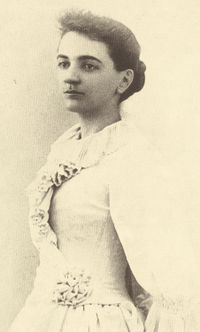Emily Bright Burnham
Emily Bright Burnham, Phi Chapter, Boston (1867-1940)
Emily Bright Burnham became Grand President after four years as Grand Secretary. During her tenure (1892-1894), she had a particular desire to perfect the organization.
Emily had a vision of the ideal Fraternity and because of this she conceived of the Second Degree, an examination that enabled Kappas who qualified, because of their comprehensive knowledge of the Fraternity, to enter into a deeper spiritual significance of Kappa. Its insigne was a tiny fleur-de-lis set with a ruby, attached to the key by a gold chain. Emily was the first initiation, and initiations first took place at the 1892 Convention, when she was elected Grand President.
Her talent for organizing and directing was apparent during her term as Grand Secretary, when she oversaw the difficult task of preparing Kappa’s first Catalogue (Membership Directory), published in May 1890. During her term on the Grand Council, six chapters and the one and only alumna group (Chicago Association Chapter, Beta Theta) were added. But her feelings on extension were considered radical; she felt it better to annex possibly excellent new chapters and eliminate less than desirable old ones than proceed slowly and with caution.
In her personal life, she, her husband Addison Burnham and three children (a fourth had died in infancy) spent summers in Maine (she organized a library there) and love canoe trips; her husband was known to walk by her side as one of the few men in suffragette parades in Boston.
She is best known, however, for her passion and devotion to eliminating the slums and tenements that powerful landlords and inert city officials had allowed to prevail in Boston. She was instrumental in the Morton Street Improvement, called “one of the best pieces of work done in the city for many years,” removing a slum of more than 700 inhabitants. In 1929 she was made chairman of the Housing Committee of the Massachusetts Civic League, watching over all state bills related to housing and town planning.
She was also the prime force in obtaining the Panhellenic House for Boston’s women’s fraternities; her husband served as attorney. She probably was criticized for these “out of home” activities because she once defended herself saying, “I am really more domestic than the average; bread is still baked in my house and floor polish is made from a family recipe.”
